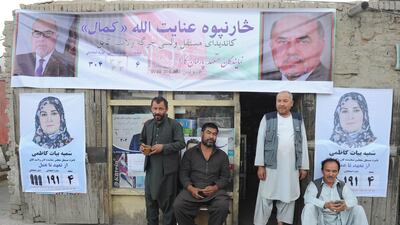The Afghan Taliban on Monday threatened to disrupt parliamentary elections later this month with increased attacks on security forces, casting doubt over US efforts to bring about a political solution to its longest war.
The Taliban threat came a day after the 17th anniversary of the US-led invasion that toppled the Islamist militants, and coincided with the first visit to Kabul by US special envoy to Afghanistan Zalmay Khalilzad since he was appointed last month.
Taliban spokesman Zabihullah Mujahid said the US was using the elections as way to “remain inside the country and maintain their authority”.
He said Afghans were being deceived through the election process into choosing "US puppets" to govern them. "The Taliban will no more allow them to rule the country in accordance to the wishes of their American masters," Mujahid told The National via WhatsApp.
“Afghans want an end to this conflict, and it is only possible with the withdrawal of the all foreign forces from Afghanistan and letting the people live under Shariah.”
Hopes of a negotiated peace agreement rose earlier this year after the first meeting between the top US official for the region and Taliban representatives, as well as the Taliban’s three-day truce for Eid Al Fitr, its first ceasefire since the war began.
Mr Khalilzad is expected to lead US delegation in a second round of talks expected soon that will focus on confidence-building, release of Taliban prisoners, another ceasefire and steps to open formal negotiations that include the government, with whom the insurgents have so far refused to have contact.
"Taliban has always opposed elections in the presence of foreign troops and the insurgent group is now seeking a realistic time-frame for the US to withdraw its troops, after which they will be ready for peace talks with the Afghan government," Rahim Ullah Yousafzai, the expert on Taliban, told The National.
Mr Khalilzad discussed “an Afghan-led and Afghan-owned peace process” in talks with President Ashraf Ghani and other top leaders on Sunday night, the president’s office said.
“Peace is a holy process, and the US government and people are united with the Afghan government and people in this process,” Mr Ghani’s office quoted the US envoy as saying.
_______________
Read more:
UN mission in Afghanistan voices concern as violence peaks ahead of elections
Suicide bomber hits Afghan election rally
Afghan roadside bomb attack kills two people
_______________
Mr Khalilzad, an Afghan-born former US ambassador to Afghanistan and Iraq, is scheduled to visit Pakistan, the UAE, Saudi Arabia and Qatar this week as he seeks to bring the Taliban to the negotiating table.
“I will use my experiences in the international arena and connections in the region to reach this goal,” he told Afghanistan’s Tolo News TV channel.
Although foreign forces ended their combat mission in December 2014, a US-led Nato mission remains in Afghanistan to train and assist Afghan forces in their fight against the insurgency, including with air strikes.
However, the Taliban have continued to expand their control, even after President Donald Trump approved a new strategy last year to extend and expand the US troop presence in Afghanistan. About 14,000 US troops are now in Afghanistan, down from a peak of about 100,000 during the Barack Obama administration.
Afghanistan’s security forces have been placed under additional strain by the growing presence of ISIS, which the Taliban considers a rival. The extremist group has been carrying out increasingly deadly attacks against civilians, particularly members of non-Sunni minorities.
The result has been a record number of civilian deaths – 1,692 – for the first six months of the year, according to the UN Assistance Mission in Afghanistan, which has been compiling statistics on the conflict since 2009.
Citizens like Sajjad Hussain, a shopkeeper from Shiite Hazara community in the Dashe Barchi locality of Kabul, see little hope of ending the conflict.
“The approaching elections give another opportunity to militants to launch more attacks and spread panic,” said Mr Hussain, who lost seven family members including two sons in Taliban and ISIS attacks.
"Every day the insurgents are getting stronger and now control one-third of the country," he told The National.

